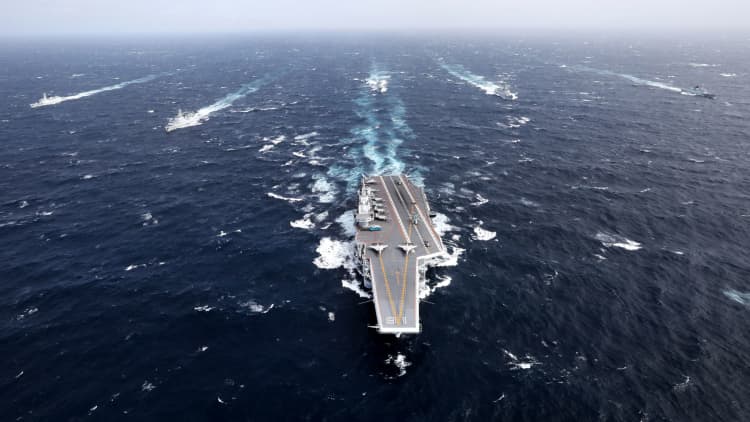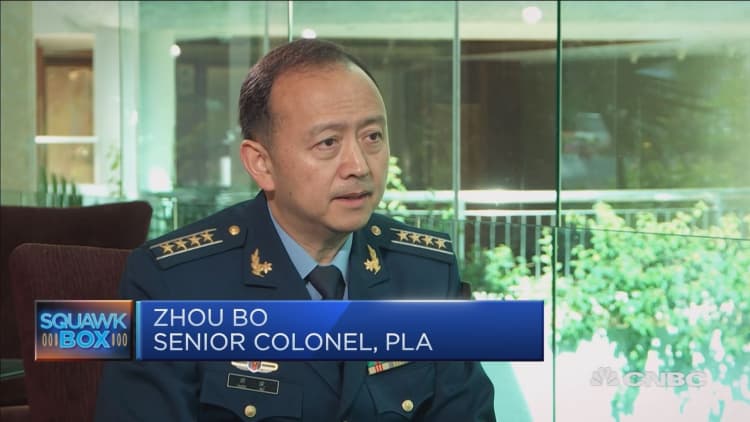Philippine President Rodrigo Duterte's pivot toward China will come under the spotlight as he meets Chinese President Xi Jinping this week.
The Southeast Asian nation is a long-time ally of the U.S., but since Duterte took office in 2016, the Philippines' ties with China have been warming. Duterte's visit to China — from Aug. 28 to Sept. 1 — is his fifth in three years. He has not made a single trip to the U.S. as president.
But the Philippine public has grown increasingly critical of the president's Beijing-friendly stance. That's especially the case after a Philippine fishing boat collided with a Chinese vessel in June in an area of the South China Sea claimed by both countries.
An international tribunal in The Hague had ruled in July 2016 that the area is an exclusive economic zone of the Philippines, but China rejected that verdict. Duterte's apparent refusal to enforce that ruling against Beijing — particularly after the June collision — contributed to anti-China protests in Manila in recent months.
Faced with mounting domestic pressure, the Philippine president said he will — for the first time — bring up the 2016 ruling when he meets the Chinese leader in Beijing. Analysts, however, aren't sure Duterte will go far enough to win over critics.
The Philippine president "emphasized he would only do this in a way that did not anger Beijing," which likely means it will be "his tone rather than policy stance" that's changing, Peter Mumford, practice head for Southeast and South Asia at risk consultancy Eurasia Group, wrote in a note last week.

There have been instances in the past when Duterte said he would push back against China, said Malcolm Cook, a senior fellow at think tank ISEAS-Yusof Ishak Institute. But those turned out to be "tactical moves" to appease his domestic critics, rather than a "strategic shift" in his stance, he added.
"I think the fact that he said 'I'm going to bring up the 2016 ruling' this time is an example of this tactical move," Cook said at a seminar in Singapore last week.
Still, Duterte has remained popular in his country. Private pollster Social Weather Stations said last month that 80% of adult Filipinos surveyed were satisfied with his performance as president. That's despite 87% of people agreeing that the government should "assert its right" in the South China Sea as stipulated by the 2016 ruling, the pollster said.
Philippines-China deals
Nevertheless, Duterte will be under some pressure to show that cozying up to China is paying off, according to analysts.
The Philippine News Agency, the government newswire, said in a report last week that Duterte and Xi are expected to sign a number of deals when they meet. The agreements will likely touch on areas such as education, science and technology, and economic and social development, according to the report.
The Philippine president, in his first visit to China in 2016, secured around $24 billion in investments and financing pledges from Xi — but little of that has been materialized.
Experts say that what Duterte's government really wants is to get the funds that Beijing promised so that more infrastructure projects can get off the ground in the Philippines.

Another deal the Philippine government may want to win relates to a proposed oil and gas exploration project in the disputed waters in the South China Sea, analysts said. The proposed project falls within the Philippine exclusive economic zone that China also claims.
Duterte claimed in 2017 that Xi had threatened war if the Philippines unilaterally drilled for oil in that part of the South China Sea. So, the two presidents last year signed an initial agreement to find ways to conduct joint exploration there.
"Duterte's administration appears hopeful that it will secure majority (60%) Philippine ownership of the proposed joint venture — or at least a deal that can be presented as such to the domestic audience," said Mumford of Eurasia Group.
Some of those deals "will likely avert a major, immediate threat to Duterte's public support," he added. But, they may "fall far short of what would be required to win over domestic critics of his China pivot."


